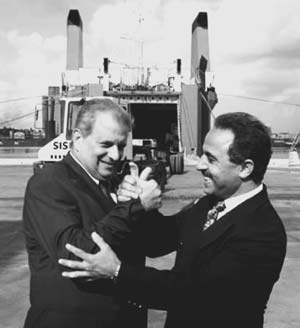![]()
Write us!
[email protected]
What Cuba Thinks
By Dagoberto Rodríguez Barrera
U.S. relations with Cuba have continued to make headlines as initial grain sales to the island and Congressional efforts to curtail U.S. trade and travel bans vie with Bush administration’s efforts to portray Cuba as a threat, including this week’s allegations that the island was deliberately obstructing anti-terrorist efforts.
On September 17, U.S. State Department official Daniel Fisk slandered the Cuban government by claiming “walk in” Cuban “agents” had routinely been providing “false leads” to the U.S. intelligence agencies engaged in investigations supposedly related to the ‘war against terrorism’, “actively and intentionally” attempting to “obstruct” it.
Cuban Foreign Minister Felipe Perez Roque denounced Fisk’s accusation as “false and slanderous. It is a colossal lie, just like when they fabricated that Cuba was a terrorist state and that we were producing biological weapons.”
This past week Washington also barred the 22 Cuban musicians invited to the Latin Grammys, citing the State Department’s designation of Cuba as a “terrorist state.”
The Cuban Ambassador will address these and other developments, as well as wide-ranging efforts to normalize U.S.-Cuban relations. Dagoberto Rodríguez, 46, is the former Director of the North American Division of Cuba’s Ministry of Foreign Affairs, and was appointed to his present post in August 2001. He holds degrees in Journalism and International Relations.
Cuba rejects Washington’s decades-long refusal to recognize its government and considers “Ambassador” as the appropriate title for Mr. Rodríguez, while the U.S. government considers him “Chief, Cuban Interests Section in Washington DC.” The Cuban Interests Section is compelled to officially function as a subsection of the Swiss Embassy.
Cuba is officially designated by the U.S. State Department as one of the world’s seven “terrorist nations.”
Cuba has energetically rejected this characterization and pointed to the many terrorist attacks on the island from bases in Florida and elsewhere as one reason for its long-standing rejection of such violence. Cuba has ratified all international anti-terrorist accords, many of which have not been signed by the United States.
U.S. collaboration with violent “anti-Castro” forces has been a key issue in Washington-Havana relations, including the current paramount conflict over the lengthy prison terms given five Cuban nationals following their hotly-disputed convictions as “spies.” The Five were attempting to prevent terror attacks against Cuba by monitoring the activities of violent counter-revolutionary groups in Florida. Cuba has designated 2002 as “the Year of the Five Heroes Unjustly Imprisoned by the Empire.”
—Dagoberto Rodríguez Barrera is Cuba’s Ambassador to the United States
 |
| A cargo ship unloads U.S. produced “supermarket” goods at the Port of Havana, August 18, 2002. Pedro Alvarez(L), president of Cuba's state-owned food import company, Alimport, and Mohamed Bouras, representing the exporter, are all smiles. This is the first shipment of such products since 1961. Photo by Rafael Perez/Reuters |
Write us
[email protected]